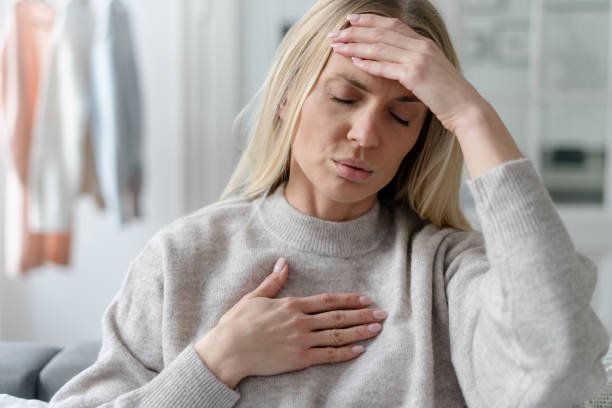Table of Contents
What Does Trapped Gas In The Chest Feel Like?
Introduction: Ever felt a tightness or pressure in your chest that sent a wave of panic through you? While chest pain can be a symptom of serious conditions, it can also be caused by something much less alarming: trapped gas. This article explores how gas pain can mimic chest pain and offers tips for finding relief.
Gas Pain Vs. Chest Pain: Understanding The Discomfort
Gas pain in the chest can be surprisingly convincing as heart-related discomfort. Both can cause tightness, pressure, and even a stabbing sensation. However, there are key differences to be aware of:
-
Location:
Gas pain tends to be felt in the upper left or right abdomen, sometimes radiating to the chest or back. Chest pain from a heart attack typically feels more central and crushing.
-
Accompanying Symptoms:
Gas pain often comes with bloating, belching, and flatulence. Chest pain from a heart attack may be accompanied by sweating, nausea, shortness of breath, and pain radiating to the jaw or arm [1].

-
Onset And Duration:
Gas pain typically comes on gradually and resolves within minutes to hours. Chest pain from a heart attack often comes on suddenly and persists.
Remember: If you experience any concerning symptoms like shortness of breath, sweating, or radiating pain, seek immediate medical attention.
What Does Trapped Gas In The Chest Feel Like?
Gas pain in the chest can manifest in various ways, and the experience can differ from person to person. Here are some common descriptions:
-
Tightness Or Pressure:
This is a frequent sensation, often described as a feeling of something constricting your chest.
-
Sharp Pains:
Some people experience sharp, stabbing pains that can mimic the discomfort of heartburn or pleurisy.
-
Burning Sensation:
A burning feeling in the chest can sometimes occur alongside gas pain, further adding to the confusion with heartburn.
-
Discomfort That Worsens With Movement:
The pain from trapped gas might intensify with certain movements like coughing, bending over, or taking a deep breath [2].
Finding Relief from Trapped Gas Pain
If you suspect gas is causing your chest pain, there are steps you can take to find relief:
-
Pass The Gas:
Burping or farting can help release trapped gas and alleviate the discomfort.
-
Apply Heat:
A heating pad or warm compress on your abdomen can help relax muscles and ease pain.
-
Over-The-Counter Medications:
Consider simethicone medications, which can help break down gas bubbles.
-
Dietary Changes:
Identify and avoid foods that trigger gas, such as beans, cruciferous vegetables, and carbonated drinks.
-
Natural Remedies:
Certain herbal teas like peppermint or ginger may aid digestion and reduce gas.
Consult your doctor if:
- The pain is severe or doesn’t improve with home remedies.
- You experience frequent episodes of gas pain.
- You have other concerning symptoms like bloating, nausea, or vomiting.
Frequently Asked Questions (FAQs)
-
Can Trapped Gas Cause Shortness Of Breath?
While severe gas pain might make it feel difficult to take a deep breath, it shouldn’t cause true shortness of breath. If you’re experiencing shortness of breath alongside chest pain, seek medical attention immediately.
-
What Foods Are Most Likely To Cause Gas?
Common gas-inducing foods include beans, lentils, cruciferous vegetables (broccoli, cauliflower), dairy products for those with lactose intolerance, and sugary drinks.
-
How Long Does Gas Pain In The Chest Typically Last?
Gas pain usually resolves within minutes to hours with home remedies like passing the gas or applying heat.
-
Can Anxiety Cause Gas Pain?
Anxiety can worsen digestive issues, including gas pain. Relaxation techniques like deep breathing can be helpful in such cases.
-
Are There Any Risks Associated With Gas Pain?
Gas pain is generally harmless. However, if it’s severe or persistent, it could indicate an underlying digestive issue that needs medical evaluation.
-
What Tests Might A Doctor Perform To Diagnose Gas Pain?
For recurring or severe gas pain, a doctor may recommend tests like a lactose intolerance test or a stool test to rule out other conditions.
-
Can Probiotics Help With Gas Pain?
Probiotics, which are live bacteria that can benefit gut health, might be helpful in reducing gas pain for some people [3].
Conclusion
Trapped gas in the chest can mimic chest pain from more serious conditions. However, by understanding the key differences and the characteristic sensations of gas pain, you can distinguish between the two. If you suspect gas is the culprit, there are various home remedies and dietary changes you can try to find relief. Remember, when in doubt, especially if you experience concerning symptoms, always seek medical attention for proper diagnosis and treatment.
Disclaimer: This article provides general information only and shouldn’t be considered a substitute for professional medical advice. Always consult your doctor for diagnosis and treatment of chest pain or any digestive issues.
References:
- Mayo Clinic
- Harvard Health Publishing
- National Institutes of Health
Discover more from Pain Relief Methods
Subscribe to get the latest posts sent to your email.
